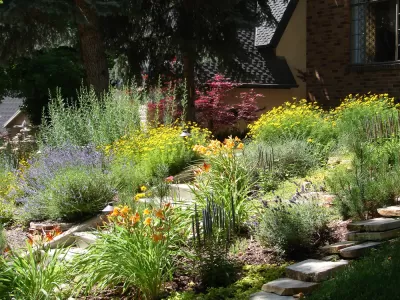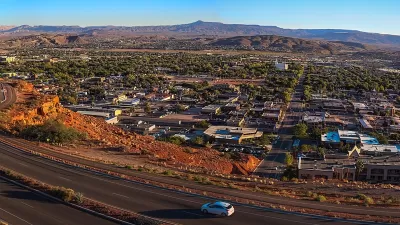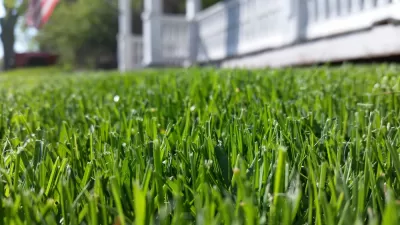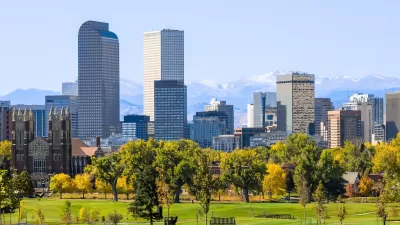Replacing lawns with native plants and grasses saves water and improves biodiversity, but some cities make the practice illegal.

In a piece in Next City, Amy McEuen calls for “yard reform,” writing that it’s time to rethink the American lawn. “To slow the pace of extinctions and pull carbon from the sky, we need laws that incentivize replacement of grass with native plantings.”
While some people may find it “impossible to unimagine” the grass lawn, more people are recognizing the value of native plants and replacing their lawns with local flora, reducing the use of water and harmful fertilizers and pesticides. But some cities and private homeowners associations actively oppose such changes, even issuing citations to homeowners who replace their lawns.
On the other side, “Some states strongly incentivize lawn removal. Nevada’s “cash for grass” rebate program pays $3 per square foot of turf grass that is removed and replaced with desert plants.” Nevada also banned ornamental grass, while Minnesota reimburses homeowners who convert lawns to pollinator gardens. McEuen recommends the creation of a model environmental municipal code similar to the Model Penal Code, which “would send local and state lawmakers the message that they need to make replacing our lawns not just acceptable but advisable.”
FULL STORY: It’s Time For Cities To Rethink Lawn Policy

Study: Maui’s Plan to Convert Vacation Rentals to Long-Term Housing Could Cause Nearly $1 Billion Economic Loss
The plan would reduce visitor accommodation by 25,% resulting in 1,900 jobs lost.

North Texas Transit Leaders Tout Benefits of TOD for Growing Region
At a summit focused on transit-oriented development, policymakers discussed how North Texas’ expanded light rail system can serve as a tool for economic growth.

Why Should We Subsidize Public Transportation?
Many public transit agencies face financial stress due to rising costs, declining fare revenue, and declining subsidies. Transit advocates must provide a strong business case for increasing public transit funding.

How to Make US Trains Faster
Changes to boarding platforms and a switch to electric trains could improve U.S. passenger rail service without the added cost of high-speed rail.

Columbia’s Revitalized ‘Loop’ Is a Hub for Local Entrepreneurs
A focus on small businesses is helping a commercial corridor in Columbia, Missouri thrive.

Invasive Insect Threatens Minnesota’s Ash Forests
The Emerald Ash Borer is a rapidly spreading invasive pest threatening Minnesota’s ash trees, and homeowners are encouraged to plant diverse replacement species, avoid moving ash firewood, and monitor for signs of infestation.
Urban Design for Planners 1: Software Tools
This six-course series explores essential urban design concepts using open source software and equips planners with the tools they need to participate fully in the urban design process.
Planning for Universal Design
Learn the tools for implementing Universal Design in planning regulations.
Ascent Environmental
Borough of Carlisle
Institute for Housing and Urban Development Studies (IHS)
City of Grandview
Harvard GSD Executive Education
Toledo-Lucas County Plan Commissions
Salt Lake City
NYU Wagner Graduate School of Public Service





























